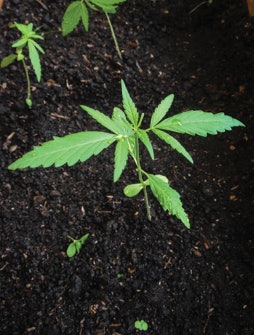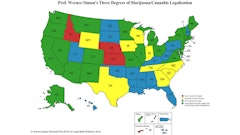
The cannabis industry finds itself on uncertain terrain. More than half of the states in the country have some form of legal cannabis, while the federal government still has a policy of prohibition. As a result, an industry that grows plants in a nation whose founding bedrock is agriculture is left to fend for itself.
The need for organic standards and generally enhanced transparency in legal cultivation is dire. In many Western states, including Colorado, pesticide use continues to be a major issue that appears a long ways away from being completely addressed. While pesticide use is not 100-percent about being organic, the issues are tied together, and the opportunity to give consumers better information and products is real – just as real as the opportunity for cultivators and processors to command a higher price for such products.
The Organic Cannabis Association (OCA) was founded by John-Paul Maxfield of Waste Farmers because he saw via his Batch: 64 brand the lack of standards available to the industry and the companies that serve it. The mission of the OCA is to create and implement rigorous organic standards in the cannabis industry because no such standards have been available to legal cannabis cultivators, upstream processors or any products developed explicitly for use in cannabis production. The OCA can help those companies derive a benefit from being organic just as we see in other industries like food and wellness.
In 2016, the OCA ran a bill through the Colorado legislature that would have created an organic program for cannabis in Colorado. The program still is in progress; we have a group of more than 40 organic, horticultural and agricultural experts from around the world participating on a committee to create the first cannabis-specific organic standards. We are presenting similar language for the 2017 legislative session and are optimistic that it will pass.
The legislation will allow third-party organizations to certify organic cannabis with the blessing of the Colorado Department of Agriculture (CDA). We are taking this approach because the USDA won't offer organic certification for marijuana or hemp that is harvested. This approach gives us cover via CDA and will result in the first-ever certified organic marijuana in the world.
We have also worked to develop a much broader base of support from the industry including marijuana and hemp growers, other industry trade groups, laboratories, processors and consumers – all of whom are interested in having certified organic product available in the cannabis category.
As a stepping-stone, before being able to certify organic and in response to some of the most troubling issues surrounding cultivation, the OCA developed a Pesticide Free certification (www.OrganicCA.org/pesticidefreecertification/). This certification indicates that the final product going to market has been tested and contains zero residual pesticides on it. Given the well-publicized pesticide problems in Colorado, Oregon, Washington and California, this certification generates tremendous value for both the industry and its consumers.
The OCA is approached almost daily by MIP (marijuana infused products — edible and extract) companies who purchase “trim” from growers to use in their products. Because they reduce the trim down to concentrated oil, pesticide use is a pronounced problem in their businesses. These businesses require accurate information regarding pesticide use in order to protect their businesses and prevent recalls of their products – and consumers should expect no less.

Currently, the Pesticide Free program is being piloted in Colorado. Only launched in late August 2016, we have already had tremendous feedback on the program and are diligently working to improve all phases of the process — inspection, sampling, testing, reporting and more. Growers and consumers from across the country have contacted us to learn about and apply for the program, and we anticipate going to other markets around the start of the second quarter of 2017.
The organic legislation in Colorado will be presented in either January or February of the 2017 Colorado General Assembly. Starting in January, the OCA began convening a working group of stakeholders from across the country to develop organic standards specific to cannabis. The expected categories for discussion are:
- Indoor soil
- Indoor hydroponic
- Outdoor
- Greenhouse
It’s certainly possible that categories will be added, and we anticipate a healthy debate around several issues, particularly hydroponic cultivation.
The need for organic standards and generally enhanced transparency in legal cultivation is dire.
The working groups will be expected to complete their efforts by June or July, anticipating that certification will be available beginning in August. While the standard will initially only be available in Colorado, work is already underway to facilitate organic certification in other legal medical and/or adult-use markets.
Just as consumers expect and demand to have organic, pesticide-free and generally safe and sustainable products in all of our supermarkets and many of our restaurants, we should expect the same from cannabis. Given that a large percentage of cannabis is consumed by smoking, it's easy to see why there should be even higher standards when it comes to this economically impactful and tremendously popular consumer product.
























